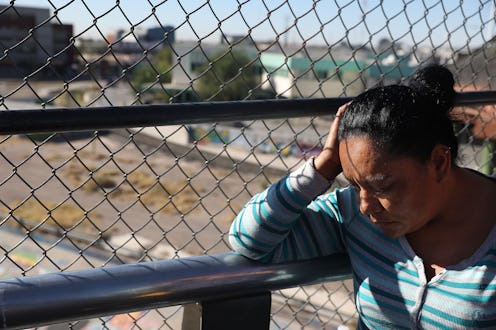News
The Consequences Of Trump Not Meeting The Family Reunification Deadline Are Blurry

Thursday is the deadline for the Trump administration to have returned all children between the ages of five and 17 with their families, and the administration is far from that goal. However, what happens to Trump if he doesn't reunite these families is unclear. The consequences for the Trump family in failing to reunite hundreds of children with their parents could range anywhere from the government being charged with contempt, to there being absolutely no repercussions whatsoever.
Currently, the administration estimates that 463 parents might have been deported from the country without their children. This makes it near impossible for the Trump administration to provide any sort of complete reunification process in the near future, even if it had reunited all other children with their parents (which it hasn't).
On July 23, the Trump administration told the court that it has still only reunited 1,200 of the estimated 2,500 detained children with their families. By July 24, the administration further clarified that it has over 600 children to reunite with their parents, though it didn't specify how many of these children have parents who have been deported. Additionally, the government said that it's identified 1,637 parents who are "eligible" for reunification, and of those 1,637, just over 1,000 have been reunited.
According to The Hill, Judge Dana Sabraw claimed on July 24 that the Trump administration was "on track" to meet the deadline of July 26 for reunification. Sabraw even called the government's efforts "a remarkable achievement."
With that said, there are still going to be children who have not yet been reunited with their parents by July 26. So what now?
First, it's important to clarify that the government didn't have to reunite all of the children, technically. It only had to reunite children with parents who were eligible for reunification. A variety of things could get in the way of a parent's eligibility, including their "fitness" as parents (a judgement that could be subjective) and their criminal histories.
As of July 24, the government had identified 914 parents that it deemed ineligible for reunification. It's unclear what will happen to the children of those parents as of now, but either way, this will not count as a failure on the part of the government.
Excluding those 914 parents, if the government fails to reunite the rest of the children with parents who are eligible for reunification, there are a variety of outcomes that might occur.
According to Sarah Pierce, a policy analyst and immigration lawyer at Migration Policy Institute who spoke to Newsweek, it is within Judge Sabraw's rights to fine or imprison government officials for not having complied with the order, but this is very unlikely. Rather, what Pierce claims is more likely is that the government will have to keep the court up to date with extra details on any reunifications that occur after the deadline.
Vox reports that the next hearing will be at 11 a.m. EST on the day of the deadline, with Judge Sabraw expected to give an updated order and deadline. It's possible that the government could face no penalty at all, given that Sabraw has expressed pleasure with how the Trump administration has done so far.
On the other hand, it's possible that the government could be charged with contempt by Sabraw. Vox notes that this would require a separate court proceeding in which a judge would have to decide upon a punishment for the entity being charged (the judge would also have to decide whether he or she is charging the government as a whole, or specific officials involved in the reunification process). Again, though, this seems pretty unlikely, given how Judge Sabraw has responded to the government's recent efforts.
The challenge of reuniting children with parents who may have been deported is bound to be arduous and time-consuming. But Greg Chen, the director of government relations at the American Immigration Lawyers Association, was quick to point out to Newsweek, "The administration really created this crisis on their own accord by separating thousands of parents from their children and inflicting incredible trauma. As this crisis has unfolded it has become increasingly clear that there was never a plan to reunify the families at the time they separated them."